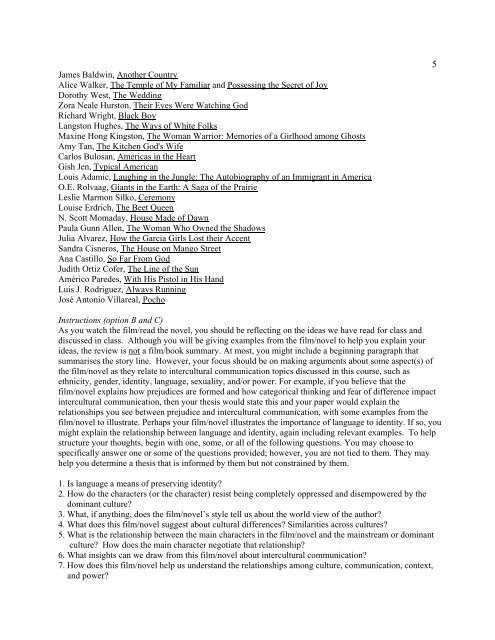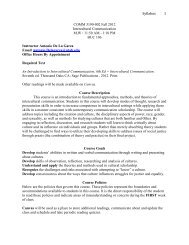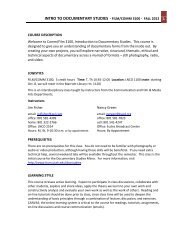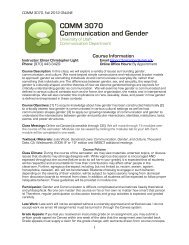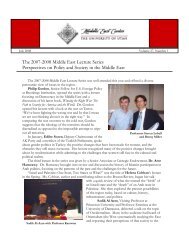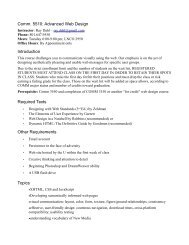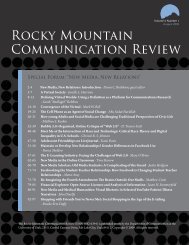Comm 3190-003 : Intercultural Communication / F 05 / M W 3:00 – 4 ...
Comm 3190-003 : Intercultural Communication / F 05 / M W 3:00 – 4 ...
Comm 3190-003 : Intercultural Communication / F 05 / M W 3:00 – 4 ...
Create successful ePaper yourself
Turn your PDF publications into a flip-book with our unique Google optimized e-Paper software.
James Baldwin, Another Country<br />
Alice Walker, The Temple of My Familiar and Possessing the Secret of Joy<br />
Dorothy West, The Wedding<br />
Zora Neale Hurston, Their Eyes Were Watching God<br />
Richard Wright, Black Boy<br />
Langston Hughes, The Ways of White Folks<br />
Maxine Hong Kingston, The Woman Warrior: Memories of a Girlhood among Ghosts<br />
Amy Tan, The Kitchen God's Wife<br />
Carlos Bulosan, Americas in the Heart<br />
Gish Jen, Typical American<br />
Louis Adamic, Laughing in the Jungle: The Autobiography of an Immigrant in America<br />
O.E. Rolvaag, Giants in the Earth: A Saga of the Prairie<br />
Leslie Marmon Silko, Ceremony<br />
Louise Erdrich, The Beet Queen<br />
N. Scott Momaday, House Made of Dawn<br />
Paula Gunn Allen, The Woman Who Owned the Shadows<br />
Julia Alvarez, How the Garcia Girls Lost their Accent<br />
Sandra Cisneros, The House on Mango Street<br />
Ana Castillo, So Far From God<br />
Judith Ortiz Cofer, The Line of the Sun<br />
Américo Paredes, With His Pistol in His Hand<br />
Luis J. Rodriguez, Always Running<br />
José Antonio Villareal, Pocho<br />
Instructions (option B and C)<br />
As you watch the film/read the novel, you should be reflecting on the ideas we have read for class and<br />
discussed in class. Although you will be giving examples from the film/novel to help you explain your<br />
ideas, the review is not a film/book summary. At most, you might include a beginning paragraph that<br />
summarises the story line. However, your focus should be on making arguments about some aspect(s) of<br />
the film/novel as they relate to intercultural communication topics discussed in this course, such as<br />
ethnicity, gender, identity, language, sexuality, and/or power. For example, if you believe that the<br />
film/novel explains how prejudices are formed and how categorical thinking and fear of difference impact<br />
intercultural communication, then your thesis would state this and your paper would explain the<br />
relationships you see between prejudice and intercultural communication, with some examples from the<br />
film/novel to illustrate. Perhaps your film/novel illustrates the importance of language to identity. If so, you<br />
might explain the relationship between language and identity, again including relevant examples. To help<br />
structure your thoughts, begin with one, some, or all of the following questions. You may choose to<br />
specifically answer one or some of the questions provided; however, you are not tied to them. They may<br />
help you determine a thesis that is informed by them but not constrained by them.<br />
1. Is language a means of preserving identity?<br />
2. How do the characters (or the character) resist being completely oppressed and disempowered by the<br />
dominant culture?<br />
3. What, if anything, does the film/novel’s style tell us about the world view of the author?<br />
4. What does this film/novel suggest about cultural differences? Similarities across cultures?<br />
5. What is the relationship between the main characters in the film/novel and the mainstream or dominant<br />
culture? How does the main character negotiate that relationship?<br />
6. What insights can we draw from this film/novel about intercultural communication?<br />
7. How does this film/novel help us understand the relationships among culture, communication, context,<br />
and power?<br />
5


